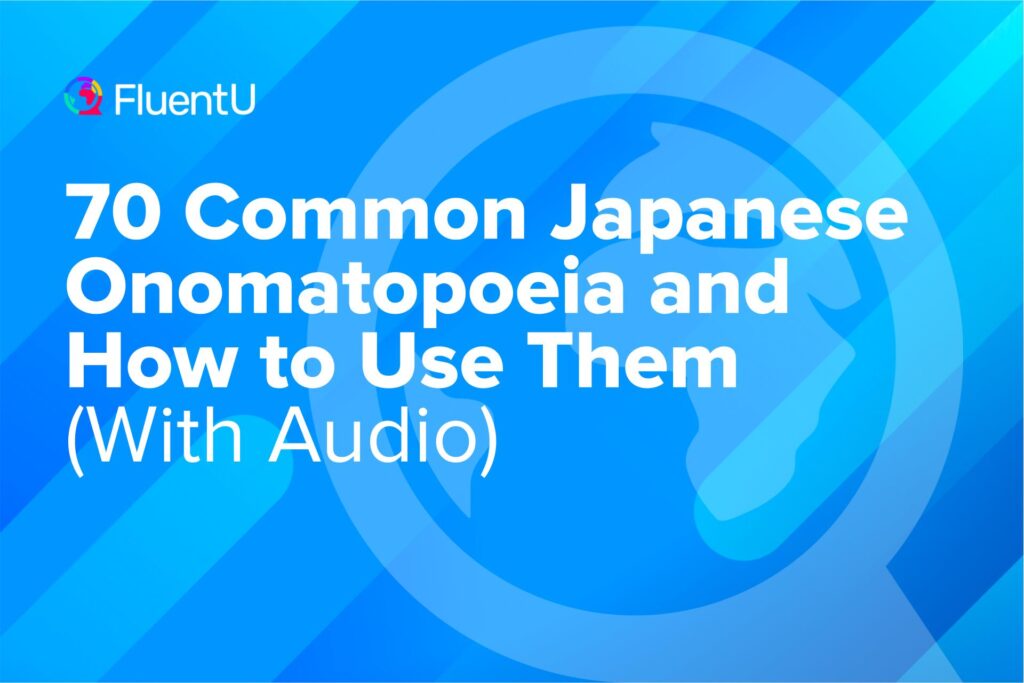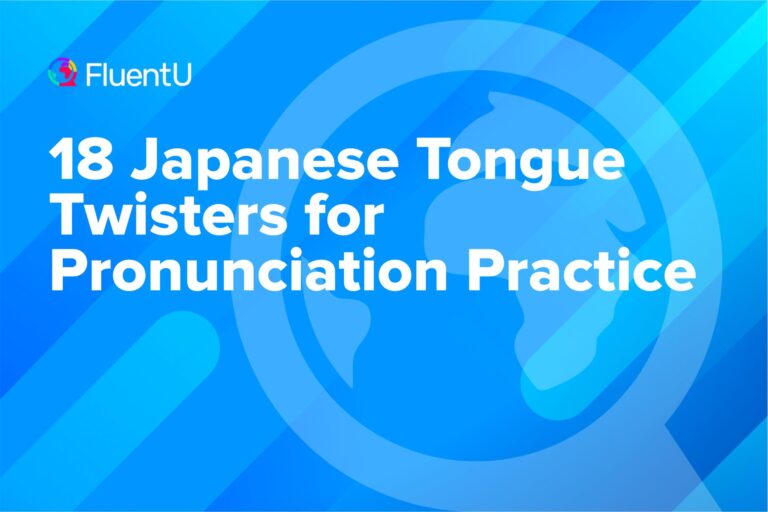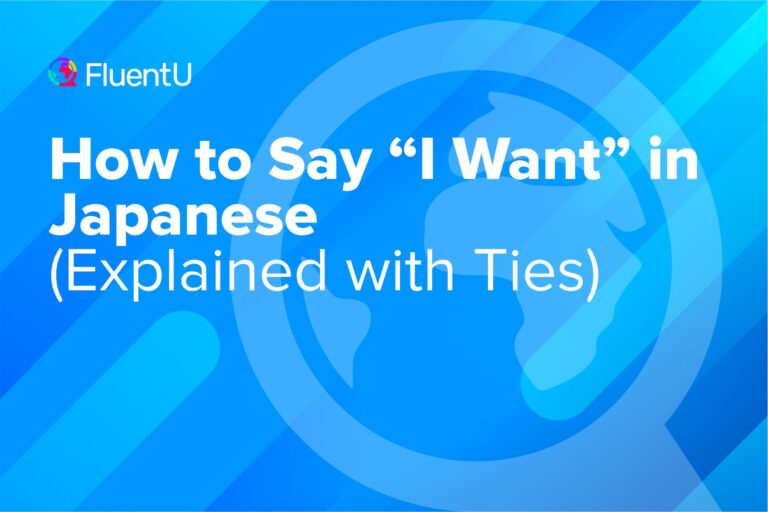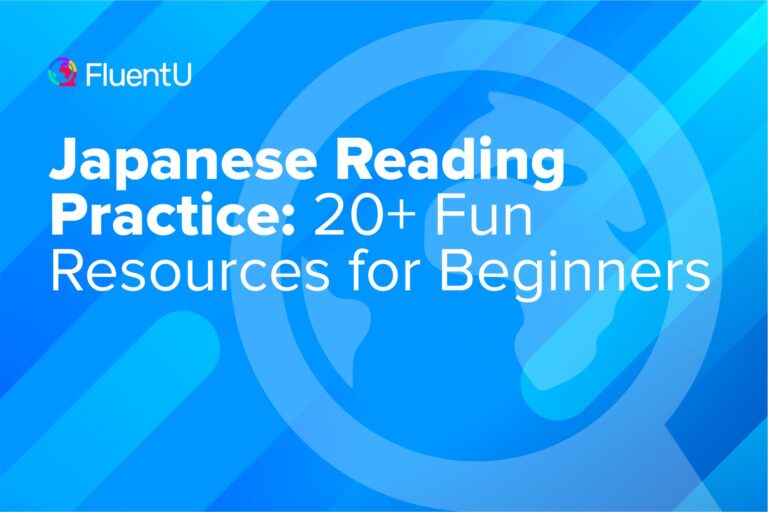Contents
- What Are The 5 Types of Japanese Onomatopoeia?
- Animal and Human Onomatopoeia — Giseigo ( 擬声語 )
- Inanimate Objects Onomatopoeia — Giongo ( 擬音語 )
- Emotions or Bodily Feelings Onomatopoeia — Gitaigo ( 擬態語 )
- Movement Onomatopoeia — Giyougo ( 擬容語 )
- Feelings and Emotions Onomatopoeia — Gijougo (擬情語)
- How to Use Japanese Onomatopoeia
- And One More Thing...
70 Common Japanese Onomatopoeia and How to Use Them (With Audio)

Woof, roar, tick-tock, ding-dong, whoosh, BOOM!
All of these are examples of onomatopoeia, or words that imitate the sound it describes.
In Japanese, onomatopoeia is known as 擬音語 (ぎおんご).
This post will give you a complete rundown on Japanese onomatopoeia— the five types, 70 useful onomatopoeia words, how the words are used in everyday Japanese and more.
Download: This blog post is available as a convenient and portable PDF that you can take anywhere. Click here to get a copy. (Download)
What Are The 5 Types of Japanese Onomatopoeia?
Onomatopoeia can be broken into five different groups:
擬声語
(ぎせいご) — Giseigo
These are sounds made by living things like birds tweeting or children laughing.
擬音語
(ぎおんご) — Giongo
These are sounds made by inanimate objects such as airplanes or creaky doors.
擬態語
(ぎたいご) — Gitaigo
These are words that depict emotions or bodily feelings, like the sound of someone growing angry or the sound of your stomach growling.
擬容語
(ぎようご) — Giyougo
These are sounds that describe movement.
擬情語
(ぎじょうご) — Gijougo
These are words that describe feelings and emotions.
Usually, onomatopoeia that mimics a sound is written in katakana.
For example, ワンワン (woof woof), ケロケロ (ribbit ribbit) and ドカン (boom!) are all written in katakana.
Onomatopoeia that mimics actions, emotions, psychological or physical states of being is usually written in hiragana.
わくわく (to get nervous or excited with anticipation), ねばねば (to be sticky) and きらきら (to shine, sparkle and glisten), for instance, are seen in hiragana.
But this isn’t a strict rule, and depending on the writer, any onomatopoeia can appear in hiragana or katakana.
Every onomatopoeia is broken into three basic forms:
Double Form: にこにこ (niko niko)
-と Form: にこっと (nikotto)
-り Form: にこり (nikori)
Using onomatopoeia in sentences will appear in one of these forms.
But not all onomatopoeia can take every one of these forms (it may only use two), and their meaning can change slightly depending on the one it’s in.
Additionally, some words look like onomatopoeia but are not. When in doubt, always double-check!
NihongoResources and Tangorin (my personal favorite) are awesome dictionaries that you can use to look up different onomatopoeia.
Animal and Human Onomatopoeia — Giseigo ( 擬声語 )
Animals
| Japanese Onomatopoeia | English |
|---|---|
| ワンワン | woof (dog) |
| ウォーッ | howl (dog) |
| ニャーニャー | meow (cat) |
| ゴロゴロ | purr (car) |
| モーモー | moo (cow) |
| ヒヒーン | neigh (horse) |
| ケロケロ | ribbit (frog) |
| ホーホー | hoot (owl) |
| チチチ | tweet (birds) |
| チュンチュン | chirp (bird) |
| リンリン | chirping (cricket) |
| チュウチュウ | squeak (mouse) |
| ぶーん | buzz (bee) |
| ブーブー | oink (pig) |
People
| Japanese Onomatopoeia | English |
|---|---|
| ちびちび | to sip a drink; to nibble on food |
| ガブガブ | gulp vigorously; swig |
| ごくごく | gulp down a drink; drink in long gulps |
| ズルズル | slurp |
| がつがつ | eating ravenously; devour |
| ぱくぱく | heartily eating; quivering lips |
| むしゃむしゃ | to munch or to chomp on something |
| すやすや | sleeping peacefully |
| ぐっすり | soundly sleeping |
| うとうと | drowsy; nodding off |
| くたくた | weak with exhaustion; worn out; beat tired |
| がみがみ | nagging (loudly); scolding |
| ぶつぶつ | grumble; muttered complaint |
| もぐもぐ | mumble |
| はきはき | unhesitating; talk clearly and briskly |
| くらくら | feel dizzy; light-headed |
Inanimate Objects Onomatopoeia — Giongo ( 擬音語 )
| Japanese Onomatopoeia | English |
|---|---|
| ぐちゃぐちゃ | pulpy; soppy; soggy |
| パリパリ | crunchy; crisp |
| ねばねば | sticky; gooey |
| ぼそぼそ | crumbly and dry; muttering under your breath |
| ちくちく | prickly pain; need-like pain |
| ずきずき | throbbing pain |
| しくしく | dull pain; gripping pain |
| バタン | shutting; bang |
| ドサッ | falling hard; falling of a heavy object |
| コンコン | knocking |
| ガシャン | crashing |
Emotions or Bodily Feelings Onomatopoeia — Gitaigo ( 擬態語 )
| Japanese Onomatopoeia | English |
|---|---|
| のろのろ | sluggishly, lazily, dragging |
| ごろごろ | stay idle; laying around; loaf around |
| べとべと | sticky |
| グルグル | dizzy |
| ピリピリ | spicy; hot |
| ほかほか | warm food or body |
| じろじろ | staring intensely |
| さっぱり | feeling refreshed |
| ひんやり | feeling cool |
Movement Onomatopoeia — Giyougo ( 擬容語 )
| Japanese Onomatopoeia | English |
|---|---|
| ガチガチ | teeth chattering |
| カバカバ | eating quickly, chewing rapidly |
| すたこら | walking briskly |
| ゆっくり | to do something slowly |
| うろうろ | wandering around aimlessly |
| がくがく | joints shaking, knees wobbling |
| ぶるぶる | trembling or shivering (from anger, fear, coldness, etc.) |
| うとうと | nodding off into sleep; half asleep |
| のろのろ | rolling; moving slow and sluggishly |
Feelings and Emotions Onomatopoeia — Gijougo (擬情語)
| Japanese Onomatopoeia | English |
|---|---|
| うずうず | to itch with desire; struggling to resist an urge |
| おろおろ | too flustered, nervous, shocked to think or move |
| そわそわ | fidgety; restless; have butterflies from excitement or nerves |
| びっくり | thrilled; surprised; frightened; shocked |
| いらいら | edgy; testy; ticked off (especially when being made to wait) |
| つんつん | to be cross; cranky; aloof |
| でれでれ | moonstruck; behave as if moonstruck |
| おたおた | shocked speechless |
| どきどき | heart pounding; nervous; excited |
How to Use Japanese Onomatopoeia
Japanese onomatopoeia is used in everyday conversation and is a great way to mix up your vocabulary and impress your friends.
Onomatopoeia helps convey a clearer message of what you’re trying to say by attaching itself to a verb.
Take the verb, “笑う“ (to laugh) for example. A loud, boisterous laugh is “ げらげら .” So to express loud laughter, or laughing out loud, we can say “ げらげら笑う! “
You can also slightly change the meaning of an onomatopoeia depending on what form it’s in or the word it’s attached to. For example:
うとうと眠る — to have a nap
うとうとする — to fall into a sleep
うとうとと眠る — to doze off to sleep
Lastly, some onomatopoeia must be used with the participle と (a particle that quotes a thought, sound or speech), such as these:
彼女は「好きです」と言った — She said, “I like it.”
彼は「ダメだ」と言った — He said, “No.”
今はすやすやと静かな寝息を立てている — Now they are sleeping soundly.
Take a look at these examples where Japanese onomatopoeia is used in common conversation:
日本語がぺらぺらになりたい
— I want to become fluent in Japanese
彼女はフランス語がぺらぺらです
— She is fluent in French
お腹がぺこぺこです
— I’m starved
朝ご飯から何も食べてなくて、お腹がぺこぺこだよ
— I haven’t eaten since breakfast, so I’m really hungry
As you can see from the last two examples, ぺこぺこ doesn’t have a direct translation like “starving” or “hungry.” Rather, it can mean both based on the context.
The same applies here:
彼女は彼をみてわくわくした
— She was excited to see him
新しい仕事にわくわくしている
— I’m thrilled with my new job
彼らはラブラブのカップルだ
— They’re a lovey-dovey couple
今、二人はラブラブだ
— Now they’re deeply in love
Since Japanese onomatopoeia is very context-based, the best way to learn new onomatopoeia and become good at using them is to immerse yourself in Japanese content.
You can do this easily by reading manga, talking to a language partner and/or using an immersion-based language learning program like FluentU.
FluentU takes authentic videos—like music videos, movie trailers, news and inspiring talks—and turns them into personalized language learning lessons.
You can try FluentU for free for 2 weeks. Check out the website or download the iOS app or Android app.
P.S. Click here to take advantage of our current sale! (Expires at the end of this month.)

Now that you’ve seen onomatopoeia, it’s just begging to be used in conversation.
Japanese onomatopoeia is used daily, so keep your eyes and ears peeled for it in your favorite manga, Japanese dramas and classic films. Or better yet, try to slip some into a conversation!
Download: This blog post is available as a convenient and portable PDF that you can take anywhere. Click here to get a copy. (Download)
And One More Thing...
If you love learning Japanese with authentic materials, then I should also tell you more about FluentU.
FluentU naturally and gradually eases you into learning Japanese language and culture. You'll learn real Japanese as it's spoken in real life.
FluentU has a broad range of contemporary videos as you'll see below:

FluentU makes these native Japanese videos approachable through interactive transcripts. Tap on any word to look it up instantly.

All definitions have multiple examples, and they're written for Japanese learners like you. Tap to add words you'd like to review to a vocab list.

And FluentU has a learn mode which turns every video into a language learning lesson. You can always swipe left or right to see more examples.

The best part? FluentU keeps track of your vocabulary, and gives you extra practice with difficult words. It'll even remind you when it’s time to review what you’ve learned. You'll have a 100% personalized experience.
Start using the FluentU website on your computer or tablet or, better yet, download the FluentU app from the iTunes or Google Play store. Click here to take advantage of our current sale! (Expires at the end of this month.)







